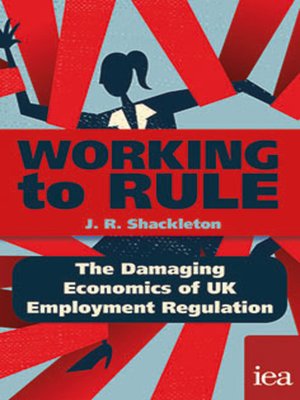Working to Rule
ebook ∣ The Damaging Economics of UK Employment Regulation: The Damaging Economics of UK Employment Regulation
By J. R. Shackleton

Sign up to save your library
With an OverDrive account, you can save your favorite libraries for at-a-glance information about availability. Find out more about OverDrive accounts.
Find this title in Libby, the library reading app by OverDrive.



Search for a digital library with this title
Title found at these libraries:
| Library Name | Distance |
|---|---|
| Loading... |
Employment regulation has been growing rapidly. This has not exclusively, or even mainly, come from the European Union. Recent UK governments have added such significant new measures as the National Living Wage, workplace pensions and the Apprenticeship Levy. The costs of such regulation are frequently assumed – by both advocates and opponents – to fall on business profits. This isn't so, except in the very short run. They are instead transferred in part to consumers, but mainly to employees themselves. Mandated benefits – longer holidays or extended maternity leave – mean reduced pay growth and fewer job opportunities. Anti-discrimination laws lead to fewer openings for disadvantaged groups, while employment protection legislation worsens job prospects for the young. Excessive regulation acts as a barrier to entry, shielding incumbents and deterring the foundation of new enterprises. Attempts to restrict new types of employment in the 'gig' economy are counterproductive, serving 'insiders' at the expense of 'outsiders'. This book combines a history of employment laws with detailed analysis of the troublesome effects of various interventions. The author argues for a fundamental rethink. Some basic labour market regulation may still be necessary, but far less than we currently have.







